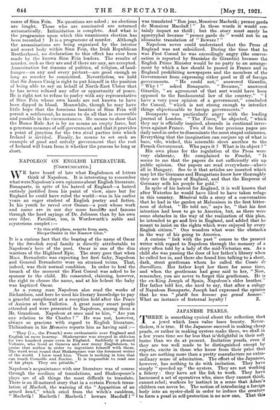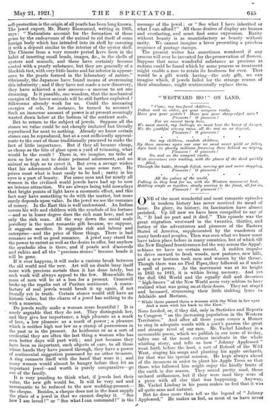JAPANESE PEARLS. T HERE is something cynical about the reflection that
a jewel which loses value loses beauty. Never- theless, it is true. If the Japanese succeed in making cheap pearls, or rather in making oysters make them, we shall in a few years time see far less that is-delightful in their soft lustre than we do at present. Imitation pearls, even if they are too well made to be distinguished except by experts, excite in those who know from their price that they are nothing more than a pretty manufacture no extra- ordinary sense of admiration. The effort of the Japanese, however, has nothing to do with imitation. They have simply " speeded up " the oysters. They are not working a fishery : they have set the fish to work. They have harnessed a set of operatives who, since they cannot think, cannot rebel; workers by instinct in a sense that Adam's children can never be. The notion of introducing a foreign body into an oyster-shell in order to induce the creature to form a pearl in self-protection is no new one. That this self-protection is the origin of all pearls has been long ]mown. The jewel expert, Mr. Harry Emmanuel, writing in 1865, says : " Naturalists account for the formation of these gems by the endeavours of the animal to rid itself of some foreign body which has intruded into its shell by covering it with a deposit similar to the interior of the oyster shell. The Chinese from a very remote period have been in the habit of inserting small beads, images, &c., in the shells of oysters and mussels, and these have certainly become coated with a pearly substance, but they are generally of a blackish tint, with very little lustre and far inferior in appear- ance to the pearls formed in the laboratory of nature." Obviously, the Japanese have found means of overcoming this inferiority ; and if they have not made a new discovery, they have achieved a new success—a success to set one dreaming. Is it possible, one wonders, that the mechanical energies of the lower animals will be still further exploited ?
Silkworms already work for us. Could the unceasing energies of eels, for instance, be turned to account ? Such an immense amount of power is at present seemingly wasted down below at the bottom of the sentient scale.
But to return to the subject of jewels. Suppose all the stones we value could be not cheaply imitated but literally reproduced for next to nothing. Already we know certain stones can be reproduced, but at a cost sufficiently approxi- mate to the cost of those traditionally procured to make the fact of little importance. But if they all became cheap, as cheap as the bits of glass upon a yard of trimming, what would be the result ? There is, we imagine, no tribe of men -so low as not to desire personal adornment, and no animal so high as to covet it. But even a savage wishes that his adornment should be in some sense rare. He prizes most what is least easily to be had ; rarity in his eyes is a part of beauty. For some men and for nearly all women in the civilized world jewels have had up to now an intense attraction. We are always being told nowadays that bright points of light have a mesmeric effect, and this fact may have something to do with the matter, but more surely depends upon value. In the jewel we see the romance of money. In the East this is well understood. An Indian covers his wife and children with the symbols of his fortune —and so in lesser degree does the rich man here, and not only the rich man. All the way down the social scale jewellery is the most romantic gift because, we suppose, it suggests sacrifice. It suggests risk and labour and enterprise—and the price of these things. There is bad romance as well as good romance. A jewel may stand for the power to extort as well as the desire to offer, but anyhow the symbolic idea is there, and if pearls and diamonds and rubies and all the "precious stones" become beads it will be gone. If it ever happens, it will make a curious break between the old world and the new. Art will no doubt busy itself more with precious =metals than it has done lately, but such work will always appeal to the few. Meanwhile the mass of men will be at a loss for a present. Cromwell broke up the regalia out of Puritan sentiment. A manu- factory of real jewels would break it up again, if not literally yet in truth. Certain stones would still have an historic value, but the charm of a jewel has nothing to do with a museum.
Do jewels really make a woman more beautiful ? It is surely arguable that they do not. They distinguish her, and they give her importance, a high pleasure as a mark of love, a low pleasure as a mark of power ; a pleasure which is neither high nor low as a stamp of possessions in the past or in the present. As heirlooms or as a sort of credential they are often the last thing a woman who has seen better days will part with ; and just because they have been so important, such objects of care, to all those whose hands they have passed through, they have a power of sentimental suggestion possessed by no other treasure. A ring connects itself with the hand that wore it ; and many women would almost be hungry before they let an important jewel—and worth is purely comparative—go out of the family. It is very puzzling to think what, if jewels lost their value, the new gift would be. It will be very sad and unromantic to be reduced to the new wedding-present- the cheque. Besides, a cheque does not in the least supply the place of a jewel in that we cannot display it. " See how I am loved !" or " See what I can command I" is the message of the jewel ; or " See what I have inherited or what I can afford ! " All these desires of display are human and everlasting, and must find some expression. Rarity without beauty is as unsatisfactory as beauty without rarity. We cannot imagine a lover presenting a priceless sequence of postage stamps. The present writer has sometimes wondered if any process will ever be invented for the preservation of flowers. Suppose that some wonderful substance as precious as radium could be found which by some process or treatment might enable a rose to retain its freshness for ever. That would be a gift worth having—the only gift, we can imagine which, if jewels failed for the strange reason of their abundance, might sentimentally replace them.



































 Previous page
Previous page